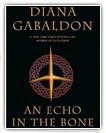Outlander aka Cross Stitch - Gabaldon Diana (библиотека электронных книг txt) 📗
“So you took Dougal, instead.”
“Oh, aye,” she said, deep in her own thoughts. “A strong man, and with some power. A bit of property. The ear of the people. But really, he’s no more than the legs, and the cock” – she laughed briefly – “of Colum MacKenzie. It’s Colum has the strength. Almost as much as I have.”
Her boastful tone annoyed me.
“Colum has a few small things that you haven’t, so far as I can see. Such as a sense of compassion.”
“Ah, yes. ‘Bowels of mercy and compassion,’ is it?” She spoke ironically. “Much good it may do him. Death sits on his shoulder; ye can see it with half an eye. The man may live two years past Hogmanay; not much longer than that.”
“And how much longer will you live?” I asked.
The irony turned inward, but the silver voice stayed steady.
“A bit less than that, I expect. No great matter. I’ve managed a good deal in the time I had; ten thousand pounds diverted to France, and the district roused for Prince Charles. Come the Rising, I shall know I helped. If I live so long.”
She stood nearly under the hole in the roof. My eyes were sufficiently accustomed to the darkness that she showed as a pale shape in the murk, a premature and unlaid ghost. She turned abruptly toward me.
“Whatever happens with the examiners, I have no regrets, Claire.”
“I regret only that I have but one life to give for my country?” I asked ironically.
“That’s nicely put,” she said.
“Isn’t it, just?”
We fell silent as it grew darker. The black of the hole seemed a tangible force, pressing cold and heavy on my chest, clogging my lungs with the scent of death. At last I huddled into as close a ball as I could, put my head on my knees, and gave up the fight, lapsing into an uneasy doze on the edge between cold and panic.
“Do ye love the man, then?” Geilie asked suddenly.
I raised my head from my knees, startled. I had no idea what time it was; one faint star shone overhead, but shed no light into the hole.
“Who, Jamie?”
“Who else?” she said dryly. “It’s his name ye call out in your sleep.”
“I didn’t know I did that.”
“Well, do ye?” The cold encouraged a sort of deadly drowsiness, but Geilie’s prodding voice dragged me a bit further out of my stupor.
I hugged my knees, rocking slightly back and forth. The light from the hole above had faded away to the soft dark of early night. The examiners would arrive within the next day or so. It was getting a bit late for prevarications, either to myself or anyone else. While I still found it difficult to admit that I might be in serious danger of death, I was beginning to understand the instinct that made condemned prisoners seek shriving on the eve of execution.
“Really love him, I mean,” Geilie persisted. “Not just want to bed him; I know you want that, and he does too. They all do. But do you love him?”
Did I love him? Beyond the urges of the flesh? The hole had the dark anonymity of the confessional, and a soul on the verge of death had no time for lies.
“Yes,” I said, and laid my head back on my knees.
It was silent in the hole for some time, and I hovered once more on the verge of sleep, when I heard her speak once more, as though to herself.
“So it’s possible,” she said thoughtfully.
The examiners arrived a day later. From the dankness of the thieves’ hole, we could hear the stir of their arrival; the shouts of the villagers, and the clopping of horses on the stone of the High Street. The bustle grew fainter as the procession passed down the street toward the distant square.
“They’ve come,” said Geilie, listening to the excitement above.
We clasped hands reflexively, enmities buried in fear.
“Well,” I said, with attempted bravado, “I suppose being burned is better than freezing to death.”
In the event, we continued to freeze. It was not until noon of the next day that the door of our prison slid abruptly back, and we were pulled out of the pit to be taken to trial.
No doubt to accommodate the crowd of spectators, the session was held in the square, before the Duncans’ house. I saw Geilie glance up briefly at the diamond-paned windows of her parlor, then turn away, expressionless.
There were two ecclesiastical examiners, seated on padded stools behind a table that had been erected in the square. One judge was abnormally tall and thin, the other short and stout. They reminded me irresistibly of an American comic-paper I had once seen; not knowing their names, I mentally christened the tall one Mutt and the other Jeff.
Most of the village was there. Looking about, I could see a good many of my former patients. But the inhabitants of the Castle were notably absent.
It was John MacRae, locksman of the village of Cranesmuir, who read out the dittay, or indictment, against the persons of one Geillis Duncan and one Claire Fraser, both accused before the Church’s court of the crime of witchcraft.
“Stating in evidence whereof the accused did cause the death of Arthur Duncan, by means of witchcraft,” MacRae read, in a firm, steady voice. “And whereas they did procure the death of the unborn child of Janet Robinson, did cause the boat of Thomas MacKenzie to sink, did bring upon the village of Cranesmuir a wasting sickness of the bowels…”
It went on for some time. Colum had been thorough in his preparations.
After the reading of the dittay, the witnesses were called. Most of them were villagers I didn’t recognize; none of my own patients were among them, a fact for which I was grateful.
While the testimony of many of the witnesses was simply absurd, and other witnesses had plainly been paid for their services, some had a clear ring of truth to their words. Janet Robinson, for example, who was haled before the court by her father, pale and trembling, with a purple bruise on her cheek, to confess that she had conceived a child by a married man, and sought to rid herself of it, through the offices of Geillis Duncan.
“She gave me a draft to drink, and a charm to say three times, at the rising o’ the moon,” the girl mumbled, glancing fearfully from Geillis to her father, unsure which one posed the greatest threat. “She said ’twould bring my courses on.”
“And did it?” Jeff asked with interest.
“Not at the first, your honor,” the girl answered, bobbing her head nervously. “But I took the draft again, at the waning o’ the moon, and then it started.”
“Started?! The lassie near bled to death!” An elderly lady, plainly the girl’s mother, broke in. “ ’Twas only because she felt herself to be dyin’ as she told me the truth o’ the matter.” More than willing to add to the gory details, Mrs. Robinson was shut up with some difficulty, in order to make way for the succeeding witnesses.
There seemed to be no one with anything in particular to say about me, aside from the vague accusation that since I had been present at Arthur Duncan’s death, and had laid hands on him before he died, clearly I must have had something to do with it. I began to think that Geilie was right; I had not been Colum’s target. That being so, I thought it possible that I would escape. Or at least I thought so until the hill woman appeared.
When she came forward, a thin, bowed woman with a yellow shawl, I sensed that we were in serious trouble. She was not one of the villagers; no one I had ever seen before. Her feet were bare, stained with the dust of the road she had walked to come here.
“Have ye a charge to make against either o’ the women here?” asked the tall, thin judge.
The woman was afraid; she wouldn’t raise her eyes to look at the judges. She bobbed her head briefly, though, and the crowd quieted its murmur to hear her.
Her voice was low, and Mutt had to ask her to repeat herself.
She and her husband had an ailing child, born healthy but then turned puny and unthrifty. Finally deciding that the child was a fairy changeling, they had placed it in the Fairy’s Seat on the hill of Croich Gorm. Keeping watch so as to recover their own child when the fairies should return it, they had seen the two ladies standing here go to the Fairy’s Seat, pick up the child and speak strange spells over it.



